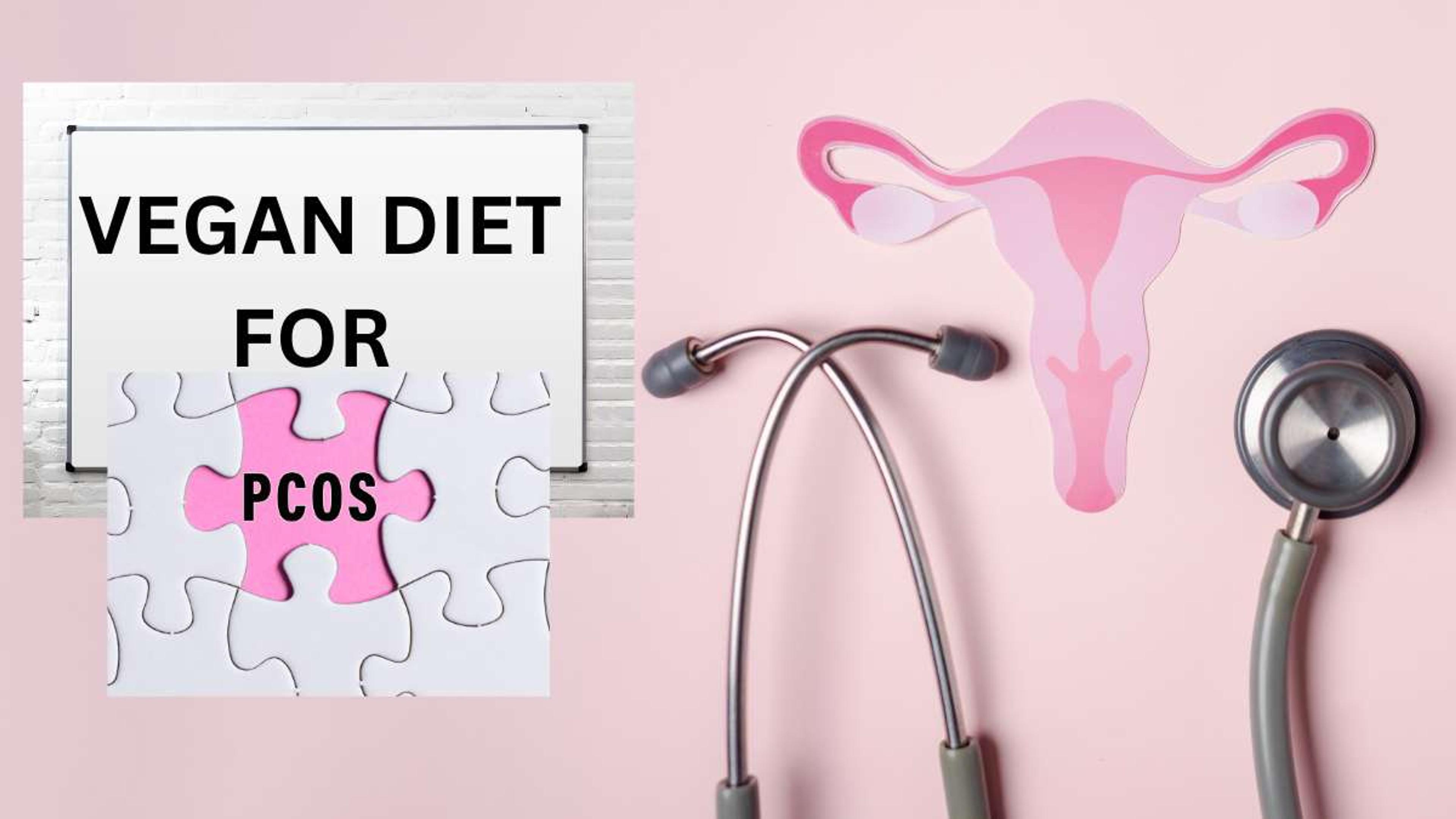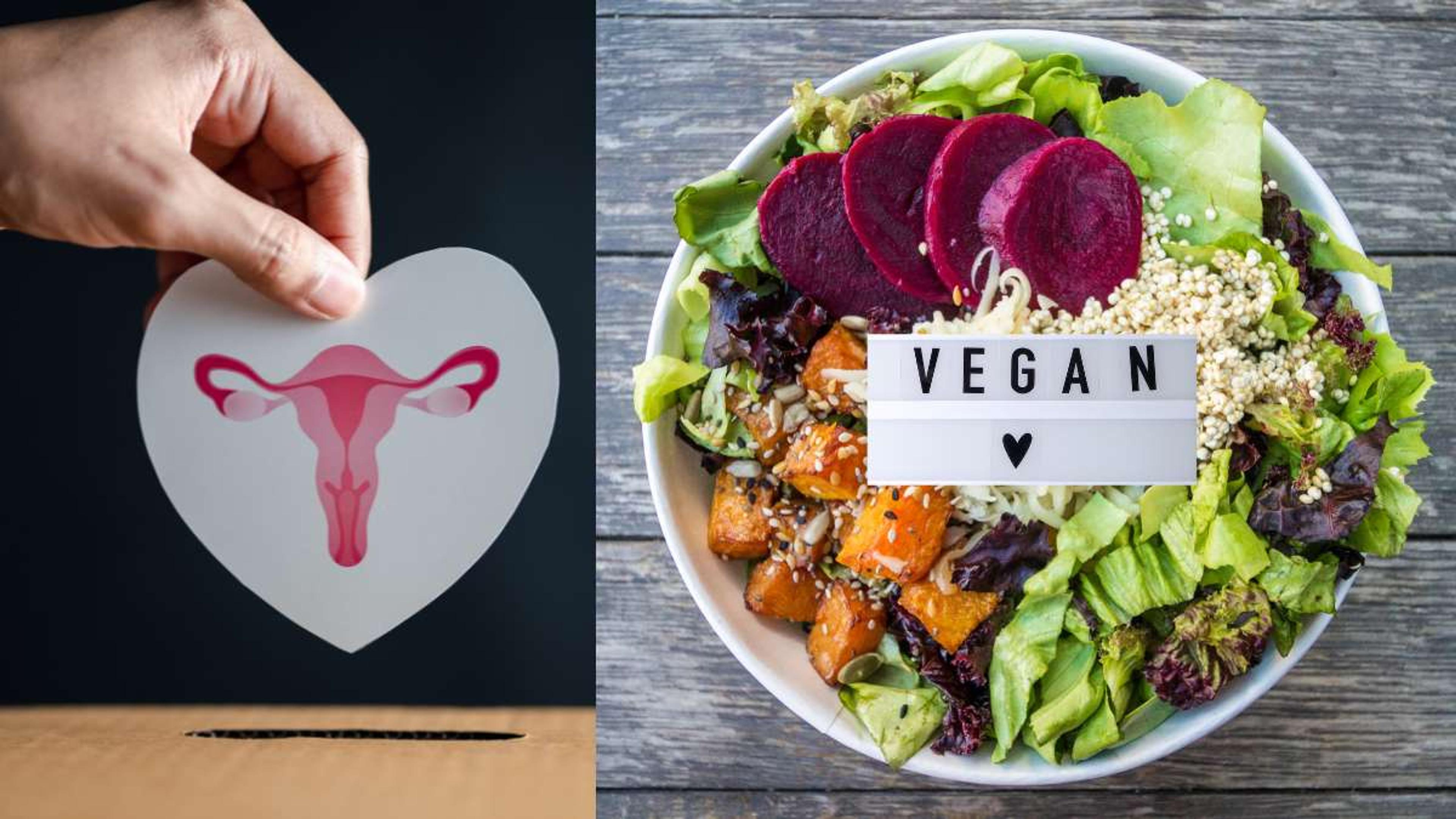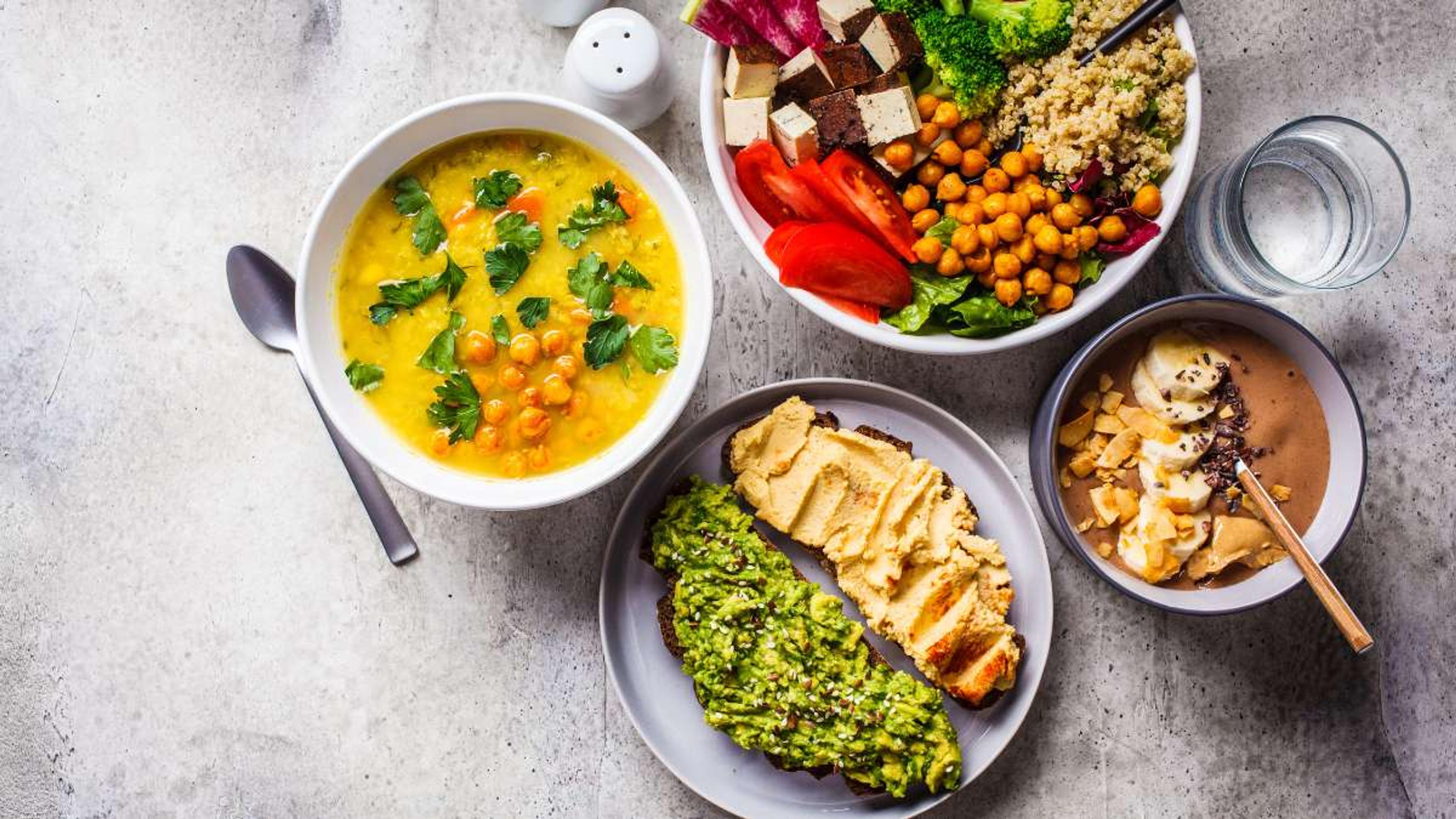Vegan Diet for PCOS: A Comprehensive Guide

- Key Takeaways
- Benefits of a Vegan Diet for PCOS
- Important Nutrients to Consider on a Vegan Diet for PCOS
- Tips for Following a Vegan Diet for PCOS
- Conclusion
- FAQs
Having 'Polycystic Ovary Syndrome' or commonly known as 'PCOS' can feel like a constant struggle, especially when trying to figure out the right diet. Did you know that adopting a vegan diet might help manage your symptoms? This article aims to explore how a plant-based lifestyle could improve aspects of this condition such as weight management and hormonal imbalances.
Read on to discover if veganism is the key to unlocking better health with PCOS!
Key Takeaways
- A vegan diet can help individuals with PCOS manage their weight by providing a low-fat and low-calorie nutrient-rich option.
- Switching to a vegan diet can contribute to balanced hormone levels in individuals with PCOS by reducing intake of saturated fats and hormones found in animal products.
- The anti-inflammatory properties of plant-based foods can help reduce inflammation often seen in PCOS, improving overall symptoms.
- A vegan diet can improve insulin sensitivity in individuals with PCOS, making it an effective dietary choice for managing this aspect of the condition.
- By focusing on plant-based foods, individuals with PCOS can ensure improved nutrient intake, supporting overall health and well-being.
Benefits of a Vegan Diet for PCOS
PCOS, or Polycystic Ovary Syndrome, is a hormonal disorder that affects many aspects of a person's health, including weight management and hormone levels. It is characterized by imbalances in hormones such as insulin and androgens, which can lead to symptoms like weight gain, irregular periods, acne, and fertility issues.
A vegan diet is centered around plant-based foods like fruits, vegetables, whole grains, legumes, nuts, and seeds while avoiding animal products like meat, dairy, and eggs. One of the ways to manage PCOS is through dietary changes, and adopting a vegan diet offer several benefits.
Firstly, a vegan diet is naturally low in fat and calories, making it an ideal choice for weight management. By focusing on nutrient-rich plant-based foods, individuals with PCOS can nourish their bodies without consuming excess fats and calories that may contribute to weight gain.
Secondly, animal products often contain hormones that can disrupt the delicate balance of hormones in individuals with PCOS. By eliminating or reducing the intake of animal products vegan diet can offer numerous benefits for individuals with PCOS, including improved weight management, balanced hormone levels, reduced inflammation, improved insulin sensitivity, and better nutrient intake.

Improved weight management
Embracing a vegan diet can lead to significant weight loss, especially for those grappling with PCOS. Notably, plant-based diets have shown positive outcomes in terms of achieving and maintaining optimal body weight.
These types of diets are rich in fiber and low in fat and calories, providing the nutrients needed without the extra energy that could potentially lead to weight gain. By adopting a vegan diet, individuals with PCOS can effectively prevent and manage obesity – a common issue associated with this health condition.
Consequently, improved weight management is one of the key benefits of following such dietary patterns among people affected by polycystic ovary syndrome.
Balanced hormone levels
A vegan diet directly contributes to balanced hormone levels, a key aspect in managing PCOS. The absence of animal protein in this dietary lifestyle reduces the intake of saturated fats and hormones often found in animal products.
This significant reduction plays an essential role by minimizing the additional hormonal inputs that sometimes escalate the symptoms of PCOS.
Plant-based diets are nutrient-rich, providing ample vitamins and minerals such as magnesium that support hormonal balance. Consuming sufficient quantities ensures improved gut health, which further aids in maintaining stability in hormone production.
In particular, women with existing high insulin levels can benefit greatly from this dietary shift by experiencing reduced insulin resistance - a notable development for those attempting to manage polycystic ovary syndrome effectively.
Reduced inflammation
Swapping over to a vegan diet can play an instrumental role in combating inflammation often seen in PCOS. Plants are nature's powerhouses packed with antioxidants, phytonutrients, and anti-inflammatory compounds that aid our bodies in dealing with oxidative stress.
Women suffering from PCOS may observe significant improvements simply by incorporating more whole grains, veggies like broccoli or peas, fruits and lentils into their meals. Research suggests that such diets boost gut health - a key player involved in inflammation.
Making this shift is not just about removing meat or dairy; it opens up a colorful array of nutrients that support overall health while managing symptoms of PCOS effectively and naturally.
Improved insulin sensitivity
A vegan diet can significantly improve insulin sensitivity in individuals with PCOS. Research has shown that eating fewer carbohydrates can lower insulin levels and enhance insulin sensitivity for those with PCOS.
In fact, plant-based dietary patterns have been linked to decreased insulin resistance, making a vegan diet particularly beneficial for improving this aspect of PCOS management. Furthermore, combining carbohydrates with protein can further enhance insulin sensitivity.
Promoting more muscle mass through a vegan diet can also contribute to improved insulin sensitivity in individuals with PCOS.
Improved Nutrient Intake
A vegan diet for PCOS can lead to improved nutrient intake. By focusing on plant-based foods such as vegetables, fruits, whole grains, legumes, soy products, nuts, and seeds, individuals with PCOS can ensure they are getting a wide range of essential nutrients.
These foods are rich in fiber and provide important vitamins and minerals like calcium and vitamin D for bone health, iron for energy levels, zinc for immune function, and B12 for nerve health.
Incorporating these nutrient-dense options into a vegan diet can help manage PCOS symptoms by supporting overall health and well-being.
Important Nutrients to Consider on a Vegan Diet for PCOS
When following a vegan diet for PCOS, it is important to consider various nutrients such as protein sources, omega-3 fatty acids, calcium and vitamin D, iron and zinc, as well as vitamin B12.

Protein sources
Including sufficient protein in a vegan diet for PCOS is important for various essential functions in the body. Here are some plant-based protein sources that can help meet your dietary needs:
- Beans: Beans, such as black beans, kidney beans, and chickpeas, are not only rich in protein but also high in fiber. They can be versatile additions to salads, soups, or main dishes.
- Lentils: Lentils provide a good amount of protein and are also packed with fiber. They can be used in stews, curries, or as a base for veggie burgers.
- Tofu: Tofu is made from soybeans and is an excellent source of plant-based protein. It can be grilled, stir-fried, or used as a meat substitute in various recipes.
- Tempeh: Similar to tofu, tempeh is made from fermented soybeans and is high in protein. It has a nutty flavor and can be marinated before cooking or used in stir-fries.
- Quinoa: While technically a seed, quinoa is often considered a whole grain and contains all essential amino acids. It can be used as a base for salads or served as a side dish instead of rice or pasta.
- Peas: Peas are not only rich in protein but also contain fiber and other beneficial nutrients. They can be added to soups, stews, or enjoyed as a side dish.
- Hemp seeds: Hemp seeds are tiny powerhouses when it comes to nutrition. They contain all essential amino acids and are rich in omega-3 fatty acids. Add them to smoothies, sprinkle over salads, or use them in homemade energy bars.
Omega-3 fatty acids play a crucial role in managing PCOS symptoms. They can improve triglyceride levels, enhance mood, and support a healthy pregnancy. Additionally, omega-3 fatty acids are beneficial for individuals with insulin resistance and high cholesterol levels. Fortunately, vegan diets can provide adequate amounts of these essential nutrients. Nuts and seeds are excellent sources of plant-based protein and omega-3 fats, making them ideal options for individuals with PCOS following a vegan diet.
Calcium and vitamin D
Calcium and vitamin D are important nutrients to consider when following a vegan diet for PCOS. These nutrients play a crucial role in maintaining overall health and managing the symptoms of PCOS. Here are some key points to keep in mind:
- Calcium: Adequate calcium intake is essential for maintaining strong bones and teeth. Women with PCOS may be at a higher risk of developing osteoporosis due to hormonal imbalances. Good plant-based sources of calcium include fortified plant milks, tofu, tempeh, almonds, chia seeds, and leafy greens like kale and broccoli.
- Vitamin D: Vitamin D is necessary for proper absorption of calcium and plays a vital role in immune function and the regulation of hormones. Many women with PCOS have been found to have low levels of vitamin D. Spending time in the sun, consuming fortified plant-based milks or cereals, mushrooms, and taking supplements can help increase vitamin D levels.
- Co-supplementation: Studies have shown that co-supplementation of vitamin D and calcium in women with PCOS can improve lipid levels (cholesterol) and reduce levels of male hormones called androgens. This can help manage PCOS symptoms such as irregular periods, acne, hair loss, and excess hair growth.
- Long-term benefits: Calcium and vitamin D supplementation has also been found to improve menstrual disturbances and metabolic factors over the long term in women with PCOS.
Iron and zinc
Iron and zinc are important nutrients to consider on a vegan diet for individuals with PCOS. Here are some key points about iron and zinc:
- Iron deficiency is common in women with PCOS, due to heavy menstrual bleeding and poor absorption.
- Adequate iron levels are crucial for maintaining healthy blood cells and preventing fatigue and weakness.
- Vegan sources of iron include legumes, nuts, seeds, whole grains, and leafy green vegetables.
- It's important to pair plant-based sources of iron with vitamin C-rich foods like citrus fruits or bell peppers to enhance absorption.
- Zinc plays a role in hormone regulation and fertility, making it especially important for individuals with PCOS.
- While zinc is found in both animal and plant foods, vegans may have a harder time obtaining adequate levels of this nutrient.
- Good vegan sources of zinc include legumes (like chickpeas and lentils), nuts, seeds (especially pumpkin seeds), tofu, tempeh, and whole grains.
- It's recommended to consume these zinc-rich foods regularly or consider taking a vegan-friendly zinc supplement if necessary.
Vitamin B12
Vitamin B12 is an essential nutrient to consider on a vegan diet for PCOS. Here are some important facts about vitamin B12:
- Vegans and vegetarians who do not consume animal products are at a higher risk of vitamin B12 deficiency.
- Vitamin B12 cannot be obtained from plant-based foods unless consumed in fortified forms or large quantities of fermented soy products.
- Individuals with PCOS may require higher levels of vitamin B12 if they are taking metformin medication.
- Adequate intake of vitamin B12 is essential for maintaining stable blood sugar and energy levels in individuals with PCOS.
- Consuming a balanced diet that includes protein, fats, and carbohydrates is important for individuals with PCOS, including getting enough vitamin B12.
Tips for Following a Vegan Diet for PCOS
Focus on whole, unprocessed plant-based foods to ensure you are getting a variety of nutrients and avoiding excessive added sugars or unhealthy fats.

Focus on whole, unprocessed plant-based foods
To optimize your vegan diet for PCOS, it's important to focus on consuming whole, unprocessed plant-based foods. These nutrient-dense options provide a wide range of vitamins, minerals, and antioxidants that can support your overall health and help alleviate PCOS symptoms. Fill your plate with plenty of colorful fruits and vegetables, such as leafy greens, berries, broccoli, and carrots. Incorporate whole grains like quinoa, brown rice, and oats for sustained energy. Legumes like chickpeas, lentils, and black beans are also great sources of plant-based protein and fiber. Don't forget about nuts and seeds – they're rich in healthy fats and can be enjoyed as a snack or added to smoothies, salads, or stir-fries. By focusing on these whole plant-based foods, you'll nourish your body with the essential nutrients it needs to thrive.
Incorporate a variety of fruits, vegetables, grains, and legumes
Incorporate a variety of fruits, vegetables, grains, and legumes to ensure a well-rounded vegan diet for PCOS:
- Fruits: Include a range of colorful fruits such as berries, oranges, apples, and bananas to provide essential vitamins and minerals.
- Vegetables: Incorporate leafy greens like spinach and kale, along with cruciferous vegetables like broccoli and cauliflower, which are rich in antioxidants and fiber.
- Grains: Opt for whole grains like quinoa, brown rice, oats, and whole wheat bread to provide complex carbohydrates and important nutrients.
- Legumes: Include beans, lentils, chickpeas, and peas as excellent sources of plant-based protein, fiber, iron, zinc, and other essential nutrients.
Monitor portion sizes and calorie intake
Monitoring portion sizes and calorie intake is crucial when following a vegan diet for PCOS. It helps in maintaining a balanced and healthy approach to food consumption. Here are some tips to keep in mind:
- Pay attention to serving sizes: Use measuring cups and spoons to ensure you are consuming appropriate portion sizes for each food group.
- Practice mindful eating: Eat slowly and listen to your body's hunger and fullness cues. This will prevent overeating and promote better digestion.
- Keep a food diary: Tracking your meals and snacks can help you become more aware of your calorie intake and identify any patterns or triggers that may affect your PCOS symptoms.
- Be mindful of high-calorie vegan foods: While many plant-based foods are nutritious, some can be high in calories. These include nuts, seeds, oils, avocados, coconut milk, and certain vegan desserts. Enjoy these foods in moderation.
- Focus on nutrient-dense foods: Choose whole, unprocessed plant-based foods such as fruits, vegetables, whole grains, legumes, and lean plant-based proteins. These foods tend to be lower in calories while providing essential nutrients.
- Prioritize fiber-rich foods: High-fiber foods like vegetables, fruits, whole grains, and legumes not only provide satiety but also regulate blood sugar levels and support weight management.
Stay hydrated and drink plenty of water
Staying hydrated and drinking plenty of water is crucial when following a vegan diet for PCOS. Adequate water intake supports weight loss, which can help alleviate symptoms of PCOS.
It also aids in flushing out toxins from the body and regulating bodily functions. Furthermore, staying hydrated promotes healthy skin and reduces inflammation, contributing to overall wellbeing.
By making hydration a priority, individuals with PCOS can support their health goals and manage their condition more effectively.
Be mindful of soy consumption
Soy consumption can have a positive impact on hormonal function for women with PCOS. Research suggests that including soy in your diet may help improve hormonal balance and other aspects of PCOS.
However, it is important to be mindful of soy consumption and not rely on it as the sole source of nutrition. While limited research exists on the specific effects of soy on symptoms like hirsutism, some individuals with PCOS may have concerns about its potential estrogenic effects.
Remember to consult with a registered dietitian for personalized guidance regarding appropriate levels of soy consumption for your individual needs.
Consult with a registered dietitian for personalized guidance and supplementation
Consulting with a registered dietitian is highly recommended when following a vegan diet for PCOS. They can provide personalized guidance and create a tailored meal plan that ensures you are getting all the necessary nutrients to effectively manage your condition.
Additionally, they can recommend any necessary supplements to support your overall health and wellbeing. A registered dietitian has the expertise and knowledge to help you make informed decisions about your dietary choices, ensuring you are on the right track towards optimal management of PCOS symptoms.
Conclusion
In conclusion, adopting a vegan diet may offer several benefits for individuals with PCOS, including improved weight management, balanced hormone levels, reduced inflammation, and improved insulin sensitivity.
By focusing on whole plant-based foods and ensuring adequate intake of important nutrients like protein, omega-3 fatty acids, calcium, iron, zinc, and vitamin B12 through supplementation if necessary, individuals with PCOS can make positive changes to support their overall health and manage their symptoms effectively.
Consulting with a registered dietitian is essential to ensure proper guidance and personalized support on a vegan diet for PCOS.
FAQs
1. Can a vegan diet help manage PCOS?
Yes, adopting a vegan diet can be beneficial for managing PCOS. A plant-based diet rich in fruits, vegetables, whole grains, and legumes can help improve insulin sensitivity and regulate hormone levels associated with PCOS.
2. What foods should I include in a vegan diet for PCOS?
A vegan diet for PCOS should include plenty of nutrient-dense foods such as leafy greens, berries, nuts and seeds, whole grains, tofu or tempeh, and plant-based protein sources like beans and lentils. It's important to ensure you're getting enough calcium from fortified non-dairy milk products or supplements.
3. Are there any nutrients that may be lacking in a vegan diet for PCOS?
While a well-planned vegan diet can provide all the necessary nutrients for managing PCOS, individuals need to pay attention to certain nutrients like vitamin B12, iron, omega-3 fatty acids (from sources like flaxseeds or walnuts), iodine (from iodized salt or sea vegetables), and vitamin D (through sun exposure or supplementation).
4. Should I consult a healthcare professional before starting a vegan diet for PCOS?
Yes, it is advisable to consult with your healthcare professional or registered dietitian before making significant dietary changes. They will be able to provide personalized guidance based on your specific needs and medical history to ensure you're meeting all of your nutritional requirements while managing your condition effectively.

